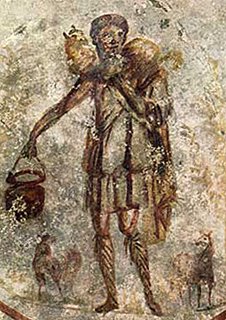 In the Philippians hymn (2:5-11), Christ empties Himself by taking the forms of a slave. He thus becomes a person without social advantage, with little or no rights or privileges of His own, for the determined purpose of placing Himself completely at the service of others (MacLeod 2001, 321). The hymn makes use of several strong terms to encourage the Christian community not to succumb to the temptations of aspiring to the social values and stratification so prevalent in Roman Philippi. Most striking is the use of the terms slave and cross; which represents respectively, “the most dishonorable public status and the most dishonorable public humiliation imaginable in the world of Roman antiquity[1]” (Hellerman 2003, 424).
In the Philippians hymn (2:5-11), Christ empties Himself by taking the forms of a slave. He thus becomes a person without social advantage, with little or no rights or privileges of His own, for the determined purpose of placing Himself completely at the service of others (MacLeod 2001, 321). The hymn makes use of several strong terms to encourage the Christian community not to succumb to the temptations of aspiring to the social values and stratification so prevalent in Roman Philippi. Most striking is the use of the terms slave and cross; which represents respectively, “the most dishonorable public status and the most dishonorable public humiliation imaginable in the world of Roman antiquity[1]” (Hellerman 2003, 424).It is important that the exemplum used in the hymn here does not speak of mere service, but the radical quest to take the form of a slave. Framing Jesus as a slave was “to assign to Him a position of greatest opprobrium[2] in the social world” of the Philippians, living the in the “most status-conscious city in the Roman East” (Hellerman 2003, 427). These words must have challenged the “dominant view of reality” for the citizens of Philippi who “valued their imperial connections, their privileges, and their advantages as subjects” (Peterson 2004, 179-180) of the Emperor. In a community so highly socially stratified as Philippi (Wortham 1996, 281) this “temporary role reversal” (Wortham 1996, 283) as slave becomes an exemplary symbol of the mutuality and common humanity of all the members of the early Christian community. The incarnational motif of the first value of kenosis finds it social scope and dimension in a resolute identification with the lowest members in the social ladder within the community. The values of servant posturing are communicated in the “denial of self-interest”, in the “divestment of status and privilege” (Saunders 1998, 18).
A recent development in Pastoral Counseling (see Gau 2000, 403-409), building on the kenotic theology of Hans Urs von Balthasar[3] , aims to make use of this leadership value of servant posturing to effect a therapeutic process where both therapist and client experience healing and enhancement that “diminishes ego and heightens self-awareness” (Gau 2000, 408). Gau (2000, 407) describes the process as follows:
“The challenge for the pastoral psychotherapist is manifesting the Christ gestalt[4] to the client. The therapist does this by self-emptying and becoming a servant to the client, speaking the client’s language, and the focusing on the client’s needs. Despite the client’s defensiveness, the therapist trusts the client’s ability to merge, individuate, and learn emptiness and receptivity. As the client comes to trust and internalize the therapist, the therapist is able to act form within the client. Out of compassion, the therapist becomes poor so that the client might become rich and absorbs the client’s sin so that the client might know the goodness of God.”
Despite the rather heavy counseling language used in this section, the multiple applications of this approach in leadership are quite evident. When leaders, having practiced kenosis, are able to enter the world of their followers and take the posture of their servants, relationships of mutual trust and healing are formed that in time removes the social and power distance between them in mutual liberation and transformation. This radical approach of mutuality and service in leadership is one of risk-taking as Gregerson (2003) so eloquently demonstrates in his premise of a theology of kenosis and risk taking.
[1] My Emphasis.
[2] Disgrace; infamy; reproach mingled with contempt.
[3] 1905-1988 CE
[4] A physical, biological, psychological, or symbolic configuration or pattern of elements so unified as a whole that its properties cannot be derived from a simple summation of its parts.
Further Reading:
Gau, J. V. 2000. The Gestalt of Emptiness/Receptivity” Christian Spirituality and Psychotherapy. Journal of Pastoral Care 54.4, 403-409.
Gregerson, N. H. 2003. Risk and Religion: Toward a Theology of Risk Taking. Zygon, vol. 38, no.2: 355-376.
Hellerman, J. H. 2003. The Humiliation of Christ in the Social World of Roman Philippi, Part 1. Bibliotheca Sacra 160.640:421-433.
MacLeod, D. J. 2001. Imitating the Incarnation of Christ: An Exposition of Philippians 2:5-8. Bibliotheca Sacra 158: 308-330.
Saunders, S. P. 1998. Philippians and Galatians. London: Westminster John Knox Press.
Wortham, R. A. 1996. Christology a Community Identity in the Philippians Hymn: The Philippians Hymn as Social Drama (Philippians 2:5-11). Perspectives in Religious Studies 23:3: 269- 287.





